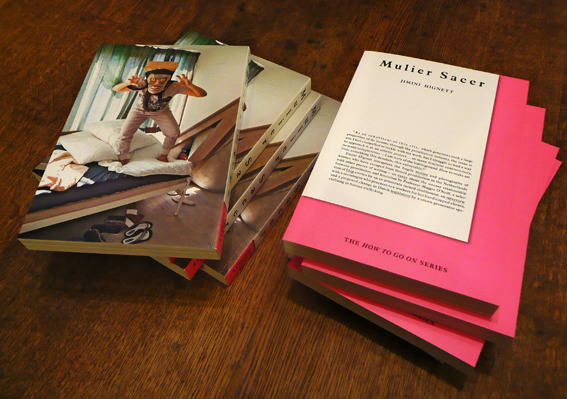MULIER SACER
Mulier Sacer is the first of my books to tackle the topic of prostitution.
It was produced to co-incide with the installation Handle With Care in the Amsterdam Tropical Museum.
You can order a copy at Books…
See the trailer or read more below…
 The title is taken from the Latin term Homo Sacer, one who is deprived of his or her full humanity, a non-citizen who does not enjoy the protection of the law and who can be killed without legal consequence.
The title is taken from the Latin term Homo Sacer, one who is deprived of his or her full humanity, a non-citizen who does not enjoy the protection of the law and who can be killed without legal consequence.
Mulier Sacer – Disposable Women from Jimini Hignett on Vimeo.
“As an inhabitant of this city, which generates such a large proportion of its income through the prostitution industry, the issue is one I feel compelled to tackle with my work, but I struggle to find a way to approach it as an artistic project… so many feminist controversies, so many complexities I am wary of the battleground. How to make art from something this desolate, this vulnerable?”
In Mulier Sacer I juxtapose the fragile stories and photographs of women who have escaped from forced prostitution in the Netherlands with other pieces of writing – an essay about the uneasy relationship between prostitution and feminism by Professor Maggie O’Neill, a selection of blog entries by an ex-prostitute turned abolitionist, an interview with a sociologist who procures sex-workers for her handicapped clients, and a proposed change in Dutch legislation by a crown prosecutor specialising in human trafficking.
Living in Amsterdam I am confronted on a daily basis with Dutch prostitution policies, this prompted me to work as a volunteer ‘crisis buddy’ at a hostel for women who have recently escaped from forced prostitution. For this publication I have worked in close collaboration with women from Amsterdam, Almere, Boskoop, Enschede and Purmerend. Their circumstances require that they remain anonymous.
The various texts are juxtaposed with photographs showing the trafficked women posing in their rooms wearing masks – self-portraits painted on brown paper bags. These help retain the women’s anonymity and at the same time they are an expression of how they see themselves. The bag-masks work in a variety of ways – in many places, a mask has magical powers and gives strength to its wearer, but at the same time they also refer to a kind of bag-over-head torture.
The other authors are:
Maggie O’Neill, professor of criminology at Durham University. Her research activity has been instrumental in moving forward debates, dialogue and scholarship in three substantive areas: prostitution and the commercial sex industry; forced migration and the asylum-migration nexus; innovative participatory, performative and visual methodologies.
A Dutch crown prosecutor Netherlands who specialises in human trafficking regularly encounters the abuses that are a day to day part of the prostitution industry where, despite all the new laws, changes of policy and well-intentioned initiatives, nothing has led to any substantial improvement in the position of these women. Her incredulity at the ease and casualness with which the exploitation of prostitutes occurs has prompted her to write this proposal for legislation in the hope that laws to ensure that the women can stand on their own two feet will diminish the number of women eager to enter into a career as prostitute. Her work requires that she remain anonymous.
Areim, who arranges ‘comprehensive assistants’ for her handicapped clients. She believes that it is entirely possible to enable respectful, professional, symbiotic relationships, which are beneficial to both parties but, although she works with women who perform this work voluntarily, prostitution still has significant social and emotional repercussions in their lives. She sees a relationship between societal attitude towards prostitutes and a general misogyny. Because of the ongoing stigmatisation of her colleagues she prefers to remain anonymous.
Rmott62 is an abolitionist, who speaks openly about the rape and torture she was subject to – speaking as a prostituted woman, not as a sex worker or a happy hooker. The torment of being prostituted has never left her and she feels let down and betrayed by feminists and the Left who refuse to see the mental, the sexual and the physical torturing that is prostitution, instead choosing to believe the illusion that the work environment can be made safer and blocking out the possibility of abolition as a long-term plan. This text comprises three entries from her anonymous blog.
Available now via the Books page of this website and soon in various bookshops.

